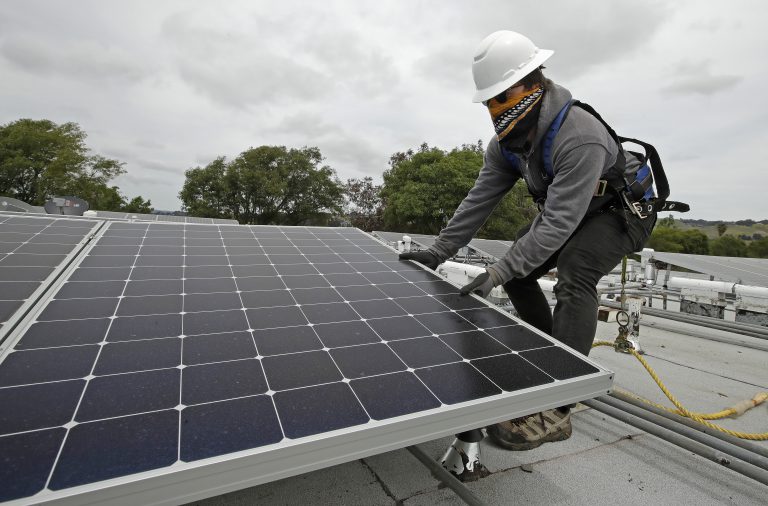Tony Martin and his wife moved back to their hometown of Teutopolis, Illinois, about a year ago to start a small solar company just as the industry was taking off in the state.
“My wife and I had always envisioned moving back to Illinois,” Martin says. “Now that solar came to Illinois, I felt like, now is the time to get back.”
Not long after they started their business, the COVID-19 pandemic began.
The pandemic has devastated small businesses, and those in the solar industry are not exempt. Martin says small solar businesses, many of which started as the industry grew significantly in recent years, have had their momentum disrupted and are now facing the challenge of staying afloat.
“We have a mini pipeline of a handful of jobs, and that will hold us over for a little while, but obviously not too long,” Martin says.
A new report from the Solar Energy Industries Association (SEIA) estimates the COVID-19 pandemic will cause Illinois to lose about 56% of solar energy jobs by June. According to the report, the solar industry will have around 114,000 fewer workers by June across the U.S., lowering the workforce number to what it was back in 2014.
“The COVID-19 crisis has really been devastating to the solar industry across the nation, and in Illinois in particular,” says Abigail Ross-Hopper, president and CEO of SEIA.
The residential, commercial and utility scale markets have all been affected, she says.
“Homeowners don’t really want people in their homes or up on their roofs,” Ross-Hopper says. “In the commercial market, if schools are closed and hospitals have other priorities right now, they don’t want contractors on their premises.”
The Future Energy Jobs Act (FEJA), which took effect in June 2017, created solar energy jobs, programs and financial incentives to help Illinois reach its clean energy goals.
The state doesn’t have exact data on job losses yet. But about a year into the bill’s incentives program, the Illinois Power Agency—which works on the development of renewable energy in the state—is seeing a slowdown in hundreds of projects, says Director Anthony Star.
“Solar projects for homes or businesses are given one year from when the project is approved to get completed,” Star says. “For community solar, which are larger projects, those projects are given 18 months. So we’re seeing more and more approved vendors coming in and requesting extensions of those deadlines.”
The projects that are being completed involve public health precautions. And companies are finding new ways to make sales while social distancing, Martin says.
“We’re basically trying to do everything we can remotely, as far as sales,” Martin says. “That has definitely been a challenge. [For] the installation part, we’re trying to do our best practices, wear face masks, use hand sanitizer, try to stay away from customers as we can.”
But even with COVID-19-related delays and job losses, Star says there’s an even bigger issue looming over the industry: funding.
“The bigger challenge for the solar industry right now is something that pre-existed COVID-19, which is a challenge with the funding structure with the incentive program for renewables in Illinois, and an upcoming funding crunch that is going to take place,” Star says.
The Future Energy Jobs Act laid out how some $230 million in funds are collected from utility ratepayers per year, which is meant to be used to fund renewable projects. Under the current legislation, those funds can only be used within a certain timeframe, otherwise the money is returned to customers.
“But that is out of sync with the timeline under which projects are being developed and incentives being paid out to them,” Star says. “And that’s exacerbated by the delays being caused by COVID-19.”
Meanwhile, the Clean Energy Jobs Act (CEJA), proposed by Gov. J.B. Pritzker, is on hold as the state battles the pandemic.
“The funding shortfall at the state level creates a long-term threat to the [solar] industry, which is compounded by the impact of COVID-19,” says Lesley McCain, executive director at the Illinois Solar Energy Association (ISEA). “Illinois has a unique opportunity to save solar jobs and create new economic growth by fixing the state’s renewable energy program.”
Some renewable energy advocates, including ISEA, say a different bill, known as the Path to 100 Act, is one solution to the funding issue.
The Path to 100 Act would raise the maximum fee utilities could charge to pay for investments in renewable energy. But discussions around new energy legislation are being placed on hold as legislators focus on more pressing matters concerning the pandemic.
The funding constraints could further delay the state’s progress in reaching its clean energy goals of 25% renewable energy by 2025.
But Anthony Star says the growing interest in solar energy’s cost-saving benefits, and its ability to reduce the use of fossil fuels, may help keep the industry afloat despite setbacks.
“We’re all learning how to be more resilient and independent,” Star says. “The idea of having solar at your own home and business—and being energy-independent—is something that I can see the attractiveness of that will continue to increase.”
Tony Martin remains optimistic that the solar industry will survive both the funding crunch and the pandemic.
“It can be a bit of a tumultuous industry,” Martin says. “We like to refer to it as the ‘solar coaster.’ So as far as COVID-19, it’s kind of par for the course for the industry, so we’ll see how we can weather the storm.”

